八年级上学期的英语语法总结(精)
- 格式:doc
- 大小:29.50 KB
- 文档页数:11
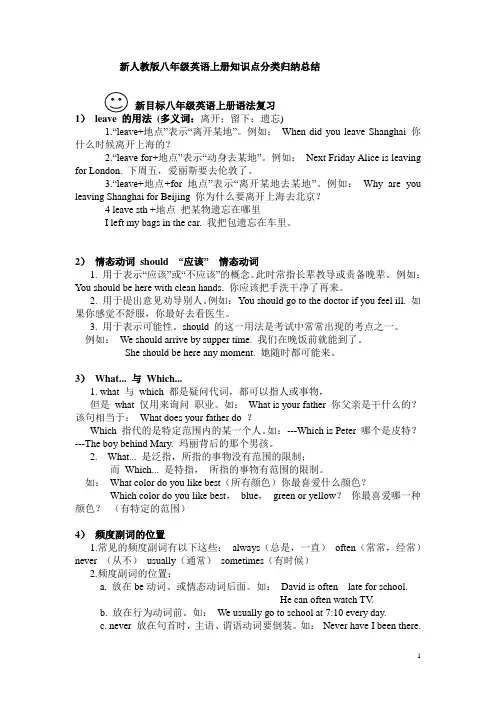
新人教版八年级英语上册知识点分类归纳总结新目标八年级英语上册语法复习1)(多义词:离开;留下;遗忘)1.“leave+地点”表示“离开某地”。
例如:When did you leave Shanghai 你什么时候离开上海的?2.“leave for+地点”表示“动身去某地”。
例如:Next Friday Alice is leaving for London. 下周五,爱丽斯要去伦敦了。
3.“leave+地点+for地点”表示“离开某地去某地”。
例如:Why are you leaving Shanghai for Beijing 你为什么要离开上海去北京?4 leave sth +地点把某物遗忘在哪里I left my bags in the car. 我把包遗忘在车里。
2)情态动词should “应该” 情态动词1. 用于表示“应该”或“不应该”的概念。
此时常指长辈教导或责备晚辈。
例如:You should be here with clean hands. 你应该把手洗干净了再来。
2. 用于提出意见劝导别人。
例如:You should go to the doctor if you feel ill. 如果你感觉不舒服,你最好去看医生。
3. 用于表示可能性。
should 的这一用法是考试中常常出现的考点之一。
例如:We should arrive by supper time. 我们在晚饭前就能到了。
She should be here any moment. 她随时都可能来。
3)What... 与Which...1. what 与which 都是疑问代词,都可以指人或事物,但是what 仅用来询问职业。
如:What is your father 你父亲是干什么的?该句相当于:What does your father do ?Which 指代的是特定范围内的某一个人。
如:---Which is Peter 哪个是皮特?---The boy behind Mary. 玛丽背后的那个男孩。
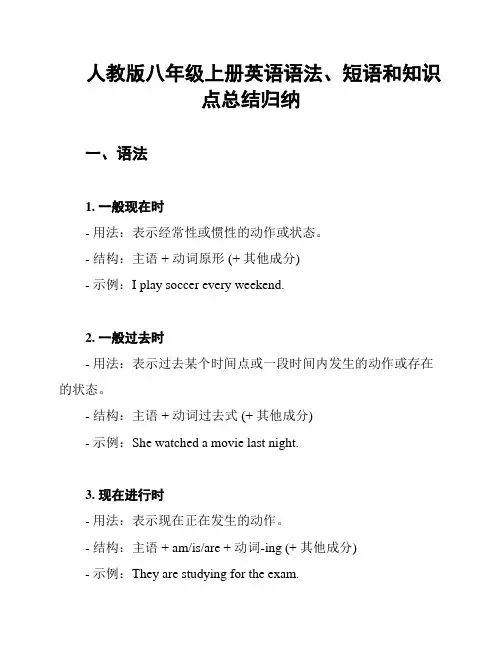
人教版八年级上册英语语法、短语和知识点总结归纳一、语法1. 一般现在时- 用法:表示经常性或惯性的动作或状态。
- 结构:主语 + 动词原形 (+ 其他成分)- 示例:I play soccer every weekend.2. 一般过去时- 用法:表示过去某个时间点或一段时间内发生的动作或存在的状态。
- 结构:主语 + 动词过去式 (+ 其他成分)- 示例:She watched a movie last night.3. 现在进行时- 用法:表示现在正在发生的动作。
- 结构:主语 + am/is/are + 动词-ing (+ 其他成分)- 示例:They are studying for the exam.4. 现在完成时- 用法:表示动作或状态发生在过去某个时间点,但与现在有关。
- 结构:主语 + have/has + 动词过去分词 (+ 其他成分)- 示例:I have finished my homework.5. 情态动词- 用法:表示能力、意愿、可能性等。
- 常见的情态动词有 can, could, may, might, must, should, ought to 等。
- 示例:He should go to bed early.二、短语1. as well as- 用法:表示两个事物同时存在或发生。
- 示例:She can speak English as well as Chinese.2. in order to- 用法:为了做某事。
- 示例:They woke up early in order to catch the train.3. by the way- 用法:用于引入一个新的话题或问题。
- 示例:By the way, have you seen the latest movie?三、知识点1. 直接引语和间接引语- 直接引语:用引号括起来的原话。
- 间接引语:将直接引语转述为陈述句或疑问句。
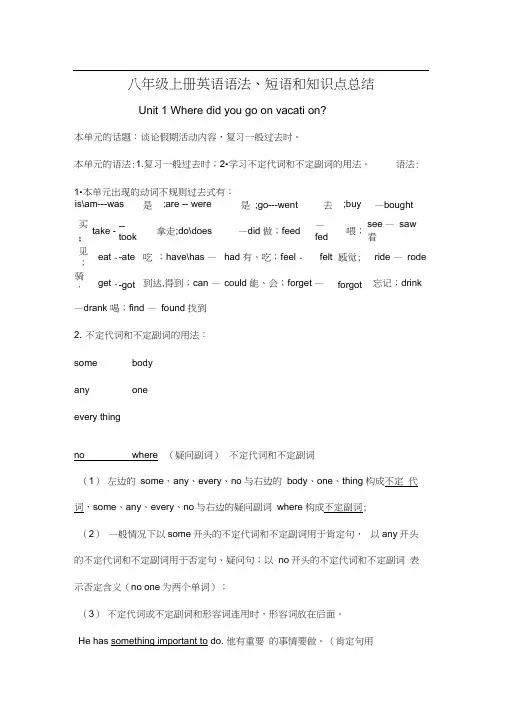
八年级上册英语语法、短语和知识点总结Unit 1 Where did you go on vacati on?本单元的话题:谈论假期活动内容,复习一般过去时。
本单元的语法:1.复习一般过去时;2•学习不定代词和不定副词的用法。
语法: 1•本单元出现的动词不规则过去式有:is\am---was 是;are -- were 是;go---went 去;buy —bought买;take ---took拿走;do\does —did 做;feed—fed喂;see —saw看见;eat --ate 吃;have\has —had 有、吃;feel -felt 感觉;ride —rode 骑;get --got 到达,得到;can — could 能、会;forget —forgot 忘记;drink —drank 喝;find —found 找到2. 不定代词和不定副词的用法:some bodyany oneevery thingno where (疑问副词)不定代词和不定副词(1)左边的some、any、every、no 与右边的body、one、thing 构成不定代词,some、any、every、no与右边的疑问副词where 构成不定副词;(2)—般情况下以some开头的不定代词和不定副词用于肯定句,以any开头的不定代词和不定副词用于否定句、疑问句;以no开头的不定代词和不定副词表示否定含义(no one为两个单词);(3)不定代词或不定副词和形容词连用时,形容词放在后面。
He has something important to do. 他有重要的事情要做。
(肯定句用something,形容词important 放后)Did you buy anything special?(一般疑问句用anything,形容词special放后)Did you go any where interesting last mon th? 上个月你去令人感兴趣的地方了吗?(一般疑问句用不定副词anywhere,形容词interesting 放后)(4)不定代词和不定副词做主语时,后面的动词用单数形式。
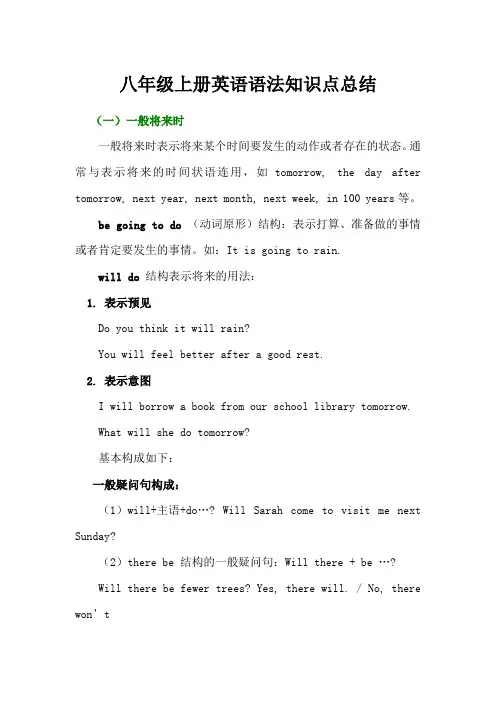
八年级上册英语语法知识点总结(一)一般将来时一般将来时表示将来某个时间要发生的动作或者存在的状态。
通常与表示将来的时间状语连用,如tomorrow, the day after tomorrow, next year, next month, next week, in 100 years等。
be going to do(动词原形)结构:表示打算、准备做的事情或者肯定要发生的事情。
如:It is going to rain.will do结构表示将来的用法:1. 表示预见Do you think it will rain?You will feel better after a good rest.2. 表示意图I will borrow a book from our school library tomorrow. What will she do tomorrow?基本构成如下:一般疑问句构成:(1)will+主语+do…? Will Sarah come to visit me next Sunday?(2)there be 结构的一般疑问句:Will there + be …?Will there be fewer trees? Yes, there will. / No, there won’t否定句构成:will + not (won’t)+doSarah won’t come to visit me next Sunday.特殊疑问句构成:特殊疑问词+will+主语+…?What will Sarah do next Sunday?练一练根据例句,用will改写下列各句例:I don’t feel well today. (be better tomorrow)I’ll be better tomorrow.1. Gina has six classes today. (have a lot of homework tonight)_____________________________2. I’m tired now. (sleep later)_____________________________3. My parents need a new car. (buy one soon)_____________________________4. We can’t leave right now. (leave a little later)_____________________________5. The weather is awful today. (be better tomorrow)_____________________________答案:1. She’ll have a lot of homework tonight.2. I’ll sleep later.3. They’ll buy one soon.4. We’ll leave a little later.5. Maybe it’ll be better tomorrow.(二)should的用法:should用来提出建议和忠告,后边加动词原形,否定句直接在should后边加not.例如:I think you should eat less junk food.我认为你应该少吃垃圾食品。
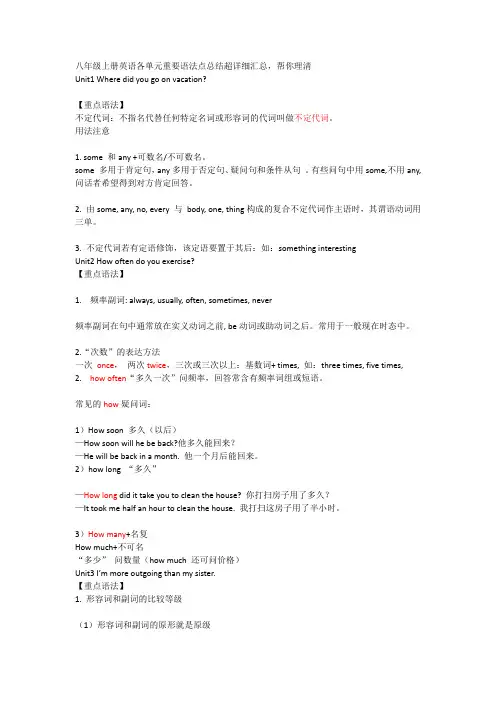
八年级上册英语各单元重要语法点总结超详细汇总,帮你理清Unit1 Where did you go on vacation?【重点语法】不定代词:不指名代替任何特定名词或形容词的代词叫做不定代词。
用法注意1. some 和any +可数名/不可数名。
some 多用于肯定句,any多用于否定句、疑问句和条件从句。
有些问句中用some,不用any, 问话者希望得到对方肯定回答。
2. 由some, any, no, every 与body, one, thing构成的复合不定代词作主语时,其谓语动词用三单。
3. 不定代词若有定语修饰,该定语要置于其后:如:something interestingUnit2 How often do you exercise?【重点语法】1.频率副词: always, usually, often, sometimes, never频率副词在句中通常放在实义动词之前, be动词或助动词之后。
常用于一般现在时态中。
2.“次数”的表达方法一次once,两次twice,三次或三次以上:基数词+ times, 如:three times, five times,2.how often“多久一次”问频率,回答常含有频率词组或短语。
常见的how疑问词:1)How soon 多久(以后)—How soon will he be back?他多久能回来?—He will be back in a month. 他一个月后能回来。
2)how long “多久”—How long did it take you to clean the house? 你打扫房子用了多久?—It took me half an hour to clean the house. 我打扫这房子用了半小时。
3)How many+名复How much+不可名“多少”问数量(how much 还可问价格)Unit3 I’m more outgoing than my sister.【重点语法】1. 形容词和副词的比较等级(1)形容词和副词的原形就是原级(2)比较级,表示较……或更……(3)最高级,表示最...。
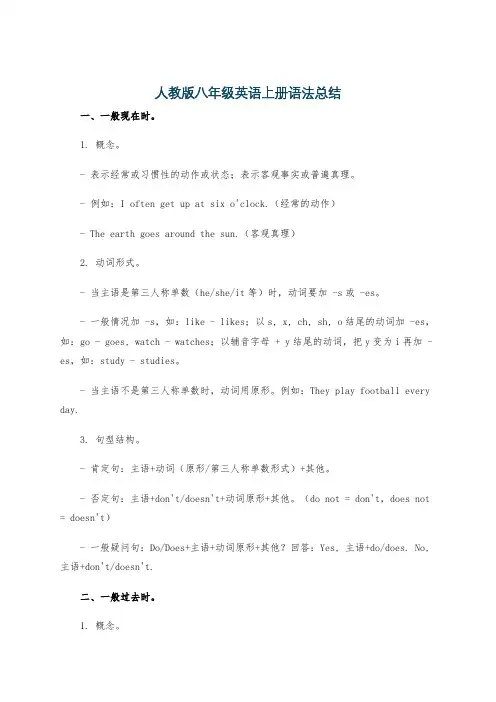
人教版八年级英语上册语法总结一、一般现在时。
1. 概念。
- 表示经常或习惯性的动作或状态;表示客观事实或普遍真理。
- 例如:I often get up at six o'clock.(经常的动作)- The earth goes around the sun.(客观真理)2. 动词形式。
- 当主语是第三人称单数(he/she/it等)时,动词要加 -s或 -es。
- 一般情况加 -s,如:like - likes;以s, x, ch, sh, o结尾的动词加 -es,如:go - goes, watch - watches;以辅音字母 + y结尾的动词,把y变为i再加 -es,如:study - studies。
- 当主语不是第三人称单数时,动词用原形。
例如:They play football every day.3. 句型结构。
- 肯定句:主语+动词(原形/第三人称单数形式)+其他。
- 否定句:主语+don't/doesn't+动词原形+其他。
(do not = don't,does not = doesn't)- 一般疑问句:Do/Does+主语+动词原形+其他?回答:Yes, 主语+do/does. No, 主语+don't/doesn't.二、一般过去时。
1. 概念。
- 表示过去某个时间发生的动作或存在的状态。
- 例如:I went to the park yesterday.2. 动词形式。
- 一般动词在词尾加 -ed,如:play - played;以不发音的e结尾的动词加 -d,如:live - lived;以重读闭音节结尾且末尾只有一个辅音字母的动词,双写这个辅音字母再加 -ed,如:stop - stopped;以“辅音字母 + y”结尾的动词,把y变为i再加 -ed,如:study - studied。
还有一些不规则动词,如:go - went, see - saw等。
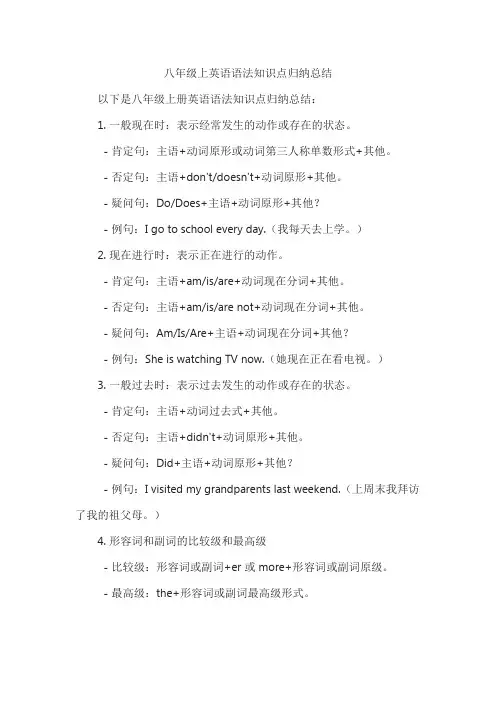
八年级上英语语法知识点归纳总结以下是八年级上册英语语法知识点归纳总结:1. 一般现在时:表示经常发生的动作或存在的状态。
- 肯定句:主语+动词原形或动词第三人称单数形式+其他。
- 否定句:主语+don't/doesn't+动词原形+其他。
- 疑问句:Do/Does+主语+动词原形+其他?- 例句:I go to school every day.(我每天去上学。
)2. 现在进行时:表示正在进行的动作。
- 肯定句:主语+am/is/are+动词现在分词+其他。
- 否定句:主语+am/is/are not+动词现在分词+其他。
- 疑问句:Am/Is/Are+主语+动词现在分词+其他?- 例句:She is watching TV now.(她现在正在看电视。
)3. 一般过去时:表示过去发生的动作或存在的状态。
- 肯定句:主语+动词过去式+其他。
- 否定句:主语+didn't+动词原形+其他。
- 疑问句:Did+主语+动词原形+其他?- 例句:I visited my grandparents last weekend.(上周末我拜访了我的祖父母。
)4. 形容词和副词的比较级和最高级- 比较级:形容词或副词+er 或 more+形容词或副词原级。
- 最高级:the+形容词或副词最高级形式。
- 例句:She is the most beautiful girl in our class.(她是我们班最漂亮的女孩。
)5. 情态动词:表示能力、许可、请求、义务等。
- 肯定句:主语+情态动词+动词原形+其他。
- 否定句:主语+情态动词 not+动词原形+其他。
- 疑问句:情态动词+主语+动词原形+其他?- 例句:You must finish your homework before watching TV.(你必须在看电视之前完成你的家庭作业。
)6. 不定代词:不指明代替任何特定名词或形容词的代词。
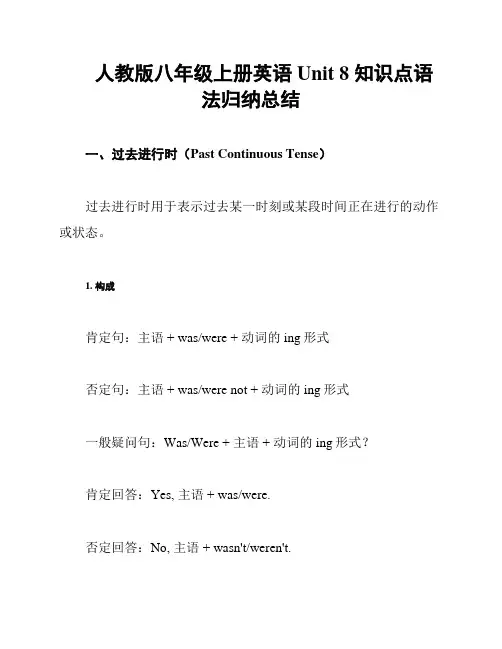
人教版八年级上册英语Unit 8 知识点语法归纳总结一、过去进行时(Past Continuous Tense)过去进行时用于表示过去某一时刻或某段时间正在进行的动作或状态。
1. 构成肯定句:主语 + was/were + 动词的ing形式否定句:主语 + was/were not + 动词的ing形式一般疑问句:Was/Were + 主语 + 动词的ing形式?肯定回答:Yes, 主语 + was/were.否定回答:No, 主语 + wasn't/weren't.2. 使用场景过去进行时常用于以下场景:- 表示过去某一时刻正在进行的动作- She was cooking dinner when I arrived. (我到达的时候,她正在做晚饭。
)- 表示过去某一段时间内持续进行的动作- They were playing basketball all afternoon. (他们整个下午都在打篮球。
)- 表示过去两个同时进行的动作- While he was studying, I was watching TV. (他在研究的时候,我正在看电视。
)二、过去完成时(Past Perfect Tense)过去完成时用于表示在过去某一时间或动作之前已经发生的动作或状态。
1. 构成肯定句:主语 + had + 过去分词否定句:主语 + hadn't + 过去分词一般疑问句:Had + 主语 + 过去分词?肯定回答:Yes, 主语 + had.否定回答:No, 主语 + hadn't.2. 使用场景过去完成时常用于以下场景:- 表示在过去某一时间或动作之前已经发生的动作- They had already left when I arrived. (当我到达时,他们已经离开了。
)- 表示过去某一时间之前已经完成的动作- She had finished her homework before dinner. (她在晚饭之前已经完成了作业。
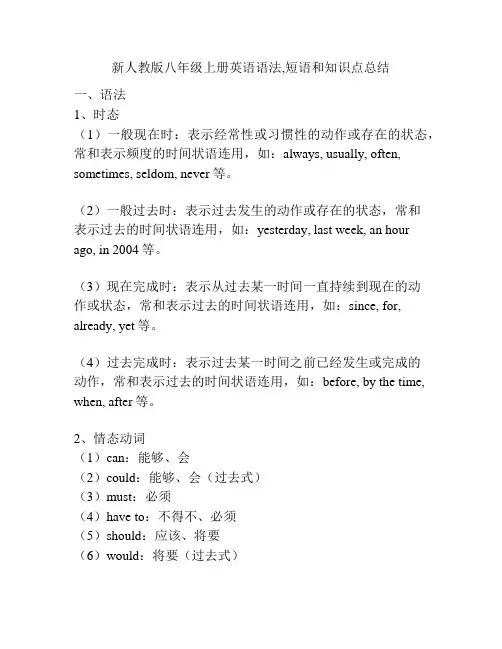
新人教版八年级上册英语语法,短语和知识点总结一、语法1、时态(1)一般现在时:表示经常性或习惯性的动作或存在的状态,常和表示频度的时间状语连用,如:always, usually, often, sometimes, seldom, never等。
(2)一般过去时:表示过去发生的动作或存在的状态,常和表示过去的时间状语连用,如:yesterday, last week, an hour ago, in 2004等。
(3)现在完成时:表示从过去某一时间一直持续到现在的动作或状态,常和表示过去的时间状语连用,如:since, for, already, yet等。
(4)过去完成时:表示过去某一时间之前已经发生或完成的动作,常和表示过去的时间状语连用,如:before, by the time, when, after等。
2、情态动词(1)can:能够、会(2)could:能够、会(过去式)(3)must:必须(4)have to:不得不、必须(5)should:应该、将要(6)would:将要(过去式)3、虚拟语气(1)一般现在时:主语+should/were to +动词原形+其他(2)一般过去时:主语+should/were to have +过去分词+其他二、短语1、make a difference:有影响,有区别2、at once:立即,马上3、take care of:照顾,照料4、in the end:最后,终于5、be good at:擅长于6、as well as:也,又7、keep healthy:保持健康8、come true:实现,成真三、知识点一般现在时:表示经常性或习惯性的动作或存在的状态,常和表示频度的时间状语连用,如:always, usually, often, sometimes, seldom, never等。
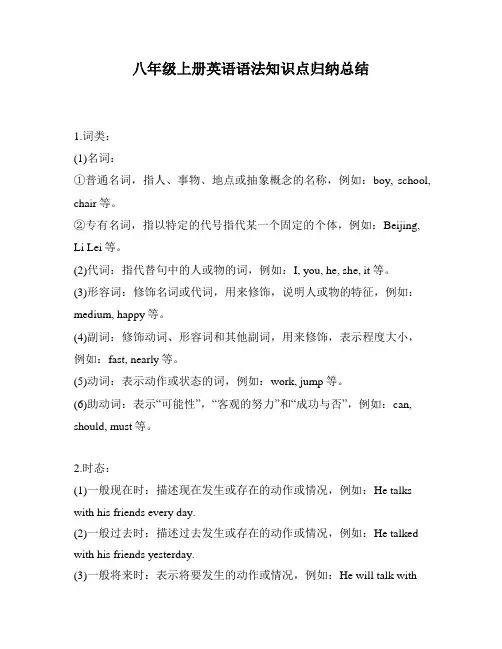
八年级上册英语语法知识点归纳总结1.词类:(1)名词:①普通名词,指人、事物、地点或抽象概念的名称,例如:boy, school, chair等。
②专有名词,指以特定的代号指代某一个固定的个体,例如:Beijing, Li Lei等。
(2)代词:指代替句中的人或物的词,例如:I, you, he, she, it等。
(3)形容词:修饰名词或代词,用来修饰,说明人或物的特征,例如:medium, happy等。
(4)副词:修饰动词、形容词和其他副词,用来修饰,表示程度大小,例如:fast, nearly等。
(5)动词:表示动作或状态的词,例如:work, jump等。
(6)助动词:表示“可能性”,“客观的努力”和“成功与否”,例如:can, should, must等。
2.时态:(1)一般现在时:描述现在发生或存在的动作或情况,例如:He talks with his friends every day.(2)一般过去时:描述过去发生或存在的动作或情况,例如:He talked with his friends yesterday.(3)一般将来时:表示将要发生的动作或情况,例如:He will talk withhis friends tomorrow.(4)现在进行时:表示正在进行的动作或情况,例如:He is talking with his friends now.(5)过去进行时:表示过去发生的持续性的动作,例如:He was talking with his friends at that time.3.句子:(1)陈述句:表述的是一个简单的事实,是客观真理,例如:He is twelve years old.(2)疑问句:表述的是一个疑问,旨在寻求答案,例如:How old is he?(3)祈使句:表述着一种请求、命令或建议,例如:Listen to me carefully.(4)感叹句:表达着一种感叹、惊讶、声明或概括的句子,例如:Whata wonderful day it is!4.句型:(1)一般疑问句:用于寻求答案的疑问句,例如:Do you have a pen?(2)特殊疑问句:用于寻求特定的信息的疑问句,例如:What colour is your schoolbag?(3)祈使句:用于表达请求、命令或建议,例如:Let's help the old man.(4)感叹句:用于表达感叹、惊叹、声明或概括,例如:Oh, how beautiful this scene is!(5)There be 句型:表示某特定人物或地点出现的情况,例如:There are three apples on the table.(6)主谓宾句:表述着动作或存在的一种句子结构,例如:He is playingbasketball.(7)宾语从句:放在句子中,用来解释主句谓语动词的一种句型,例如:He said that he would go to the park.。
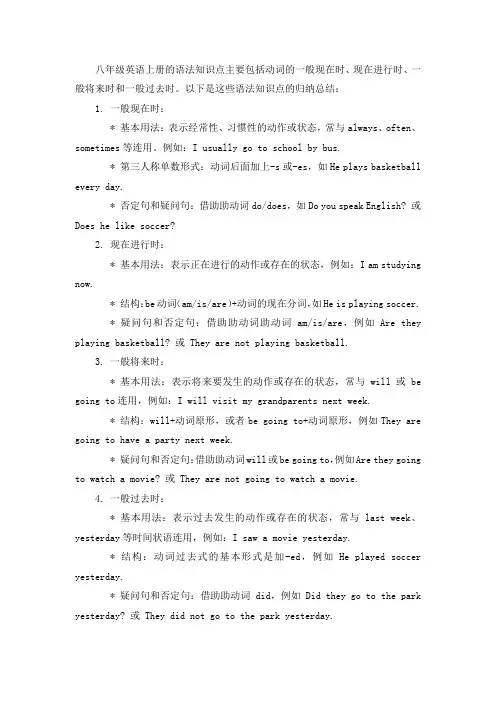
八年级英语上册的语法知识点主要包括动词的一般现在时、现在进行时、一般将来时和一般过去时。
以下是这些语法知识点的归纳总结:1. 一般现在时:* 基本用法:表示经常性、习惯性的动作或状态,常与always、often、sometimes等连用。
例如:I usually go to school by bus.* 第三人称单数形式:动词后面加上-s或-es,如He plays basketball every day.* 否定句和疑问句:借助助动词do/does,如Do you speak English? 或Does he like soccer?2. 现在进行时:* 基本用法:表示正在进行的动作或存在的状态,例如:I am studying now.* 结构:be动词(am/is/are)+动词的现在分词,如He is playing soccer.* 疑问句和否定句:借助助动词助动词am/is/are,例如Are they playing basketball? 或 They are not playing basketball.3. 一般将来时:* 基本用法:表示将来要发生的动作或存在的状态,常与will或be going to连用,例如:I will visit my grandparents next week.* 结构:will+动词原形,或者be going to+动词原形,例如They are going to have a party next week.* 疑问句和否定句:借助助动词will或be going to,例如Are they going to watch a movie? 或 They are not going to watch a movie.4. 一般过去时:* 基本用法:表示过去发生的动作或存在的状态,常与last week、yesterday等时间状语连用,例如:I saw a movie yesterday.* 结构:动词过去式的基本形式是加-ed,例如He played soccer yesterday.* 疑问句和否定句:借助助动词did,例如Did they go to the park yesterday? 或 They did not go to the park yesterday.以上是八年级英语上册的主要语法知识点总结。
八年级上册英语短语总结第1篇表示在过去某个时候发生的动作或存在的状态,也表示在过去某段时间里经常发生的习惯性动作。
1.肯定形式:主语+动词过去式+其它。
2.否定形式:主语+didn't +谓语动词原形+其它。
3.一般疑问句:①Did+主语+谓语动词原形+其它? ②Was/Were+主语+表语?4.特殊疑问句:疑问词+ did+主语+动词原形+其它?5.一般过去时记忆口诀一般过去时并不难,过去动作、状态记心间。
动词要用过去式,时间状语句末站。
否定句很简单,didn't 站动原前,其它部分不要变。
一般疑问句也好变,did放句子前,主语、动原、其它部分依次站立。
特殊疑问句也简单,疑问词加一般疑问句记心间。
一般过去时表示过去某个时间或某一段时间内发生的动作或存在的状态,常和过去的时间状语连用。
八年级上册英语短语总结第2篇复习重点会使用频率副词及短语;能描述课余时间的活动安排;会描述基本饮食结构。
语言目标● What do you usually doon weekends? I sometimes go to the beach.● How often do you eatvegetables? Every day● Most students dohomework every day.重点词汇● always, usually, often, sometimes , hardly , ever, never.● how often, once, twice , three times a week , every day.应掌握的词组1. go to the movies去看电影2. look after = take care of照顾八年级上册英语短语总结第3篇1. be able to do sth. 能够xxx事2. agree with sb. 同意\赞同某人(或某人的意见)3. wake up 喊醒,唤醒,醒来4. fall down 突然倒下,跌倒,倒塌5. hundreds of 许多;成百上千6. have many different shapes 拥有很多不同的形状7. in 25 to 50 years 在25到50年以后8. fewer/more+可数名词复数更少/更多……9. less/more+不可数名词更少/更多……10. have to do sth. 不得不xxx事11. such+名词(词组) 如此……12. There will be + 主语+其他将会有……13. There is\ are going to be + 主语 + 其他将会有…...14. try to do sth. 尽力xxx事15. It’s+ adj. + for sb. to do sth. xxx事对某人来说是……的16. seem impossible 似乎不可能17. robots more like humans 更像人类的机器人18. in the near future 在不远的将来19. at some point 在某种情况下,在某一时刻20. which side 哪一方21. as a reporter 作为一名记者22. during the week 在一周的工作日内23. during the holiday 在假期里24. on the weekend=at the weekend=on weekends=at weekends在周末25. one day 一天,有一天(可用于一般过去时和一般将来时)26. be human-like 形似真人的,真人一样的27. be bird-like 形似鸟儿的,像鸟一样的28. when possible 当可能的时候最新范文八年级上册英语短语总结第4篇语法:一.一般将来时:一般将来时表示将来某一时刻的动作或状态,或将来某一段时间内经常的动作或状态。
新人教版初二上学期英语语法总结及复习要点一、动词时态在初二上学期,学生们将接触到更多的动词时态,包括现在完成时、过去进行时和将来完成时等。
1. 现在完成时现在完成时表示过去发生的动作对现在造成的影响或结果,或者表示过去发生的动作一直持续到现在。
常与already, yet, just, ever, never等副词连用。
例:I have already finished my homework.(我已经完成了我的作业。
)She has never been to Beijing.(她从未去过北京。
)2. 过去进行时过去进行时表示过去某一时刻或某一段时间正在进行的动作。
其结构为“was/were + 现在分词”。
例:When I called you, you were watching TV.(我打电话给你时,你正在看电视。
)They were playing football at that time.(那个时候他们正在踢足球。
)3. 将来完成时将来完成时表示在将来某一时刻之前已经完成的动作,或表示在将来某一时刻之前将会完成的动作。
其结构为“willhave + 过去分词”。
例:By next year, I will have learned 5000 English words.(到明年,我将会学到5000个英语单词。
)She will have finished her project by tomorrow.(到明天,她将会完成她的项目。
)二、直接引语和间接引语在初二上学期,学生们将更深入地学习直接引语和间接引语之间的转换,包括时态、人称和语序的变化。
1. 时态的变化当直接引语是一般现在时,间接引语应根据具体情况变为相应的时态。
例:He said, "I am a student."(他说:“我是一名学生。
”)He said he was a student.(他说他是一名学生。
八年级上册英语语法、短语和知识点总结Unit 1 Where did you go on vacation?本单元的话题:谈论假期活动内容,复习一般过去时。
本单元的语法:1。
复习一般过去时;2。
学习不定代词和不定副词的用法。
语法:1.本单元出现的动词不规则过去式有:is\am——-was是are -- were是go—--went去buy—bought买take —-—took拿走, do\does—did feed—fed喂see—saw 看见eat—ate 吃have\has—had 有,吃feel-felt感觉ride—rode骑get—got到达,得到can—could能,会forget—forgot忘记drink—drank喝find—found 找到2。
不定代词和不定副词的用法:some bodyany oneevery thingno where(疑问副词)不定代词和不定副词(1)左边的some、any、every、no与右边的body、one、thing构成不定代词,some、any、every、no与右边的疑问副词where构成不定副词;(2)一般情况下以some开头的不定代词和不定副词用于肯定句,以any开头的不定代词和不定副词用于否定句、疑问句;以no开头的不定代词和不定副词表示否定含义(no one为两个单词);(3)不定代词或不定副词和形容词连用时,形容词放在后面。
He has something important to do.他有重要的事情要做。
(肯定句用something,形容词important放后)Did you buy anything special?(一般疑问句用anything,形容词special放后)Did you go anywhere interesting last month?上个月你去令人感兴趣的地方了吗?(一般疑问句用不定副词anywhere,形容词interesting放后)(4)不定代词和不定副词做主语时,后面的动词用单数形式。
八年级上册英语语法重点知识归纳英语重点短语1. 去度假go on vacation2.待在家里stay at home3.去爬山go to the mountains4.去海滩go to the beach5.参观博物馆visit museums6.去参观夏令营go to summer camp7.相当多quite a few8.为……而学习study for9.出去go out10.大部分时间most of the time11.尝起来很好吃taste good12.玩得高兴have a good time13.当然of course14.给……的感觉;感受到feel like15.去购物go shopping重点句型及考点1.为某人买某物buy sth. for sb. / buy sb. sth.2.尝起来……taste + adj.3.看起来……look+adj.4.除了……之外什么都没有nothing…but+动词原形5.看起来……seem+(to be)+ adj.6.到达某地arrive in+大地点 / arrive at+小地点7.决定去做某事decide to do sth.8.尝试做某事try doing sth.尽力去做某事try to do sth.9.忘记做过某事forget doing sth.忘记做某事forget to do sth.10.喜欢做某事enjoy doing sth.11.想去做某事want to do sth.12.开始做某事start doing sth.八年级上册英语句型1 .tell sb. (not) to do sth.告诉某人(不要)做某事2 .want sb. to do sth.想要某人做某事3 .be busy with sth.忙于某事4 .spend money/time on(doing) sth.花费金钱/时间去做某事5 .hope to do sth./hope(that)…希望……6 .wish sb. to do sth.希望某人做某事7 .find sb. doing sth.发现某人正在做某事8 .remember to do sth.记得要去做某事 remember doing sth.记得曾经做过某事9 .forget to do sth.忘记要去做某事 forget doing sth.忘记曾经做过某事10 .plan to do sth.计划做某事11 .take sb. some time/money to do sth.做某事花费某人时间/金钱12 .sb. pay(s) money for sth.某人在某物上花费金钱。
八年级上册英语语法知识点
本篇文档旨在介绍八年级上册英语语法知识点,包括但不限于以下几个方面:
时态
1. 一般现在时:主语+动词原形(第三人称单数加-s)
2. 现在进行时:主语+be(am/is/are)+现在分词
3. 一般过去时:主语+动词过去式
4. 过去进行时:主语+was/were+现在分词
5. 现在完成时:主语+have/has+过去分词
名词
1. 可数名词:可以用数字进行计数的名词,如book, apple, pen 等,有单数和复数形式
2. 不可数名词:不能用数字进行计数的名词,如water, milk, music等,只有单数形式
3. 可数名词的复数形式:在名词后面加-s或-es,如books, apples, boxes等
4. 不规则名词复数形式:如child——>children, mouse——
>mice等
介词
1. in:表达时间、地点等,“在...之中”
2. on:表示日期、星期几等,“在...上面”
3. at:表达确切时间,“在...时候”
4. to: 表达方向,“去...”
形容词和副词
1. 形容词:修饰名词,如big, small, pretty等
2. 副词:修饰动词,形容词和其他副词,如quickly, very, well 等
代词
1. 主格人称代词:I, you, he, she, it, we, they
2. 宾格人称代词:me, you, him, her, it, us, them
以上是八年级上册英语语法的一些基本知识点,希望对各位同学有所帮助。
英语初二上语法知识点摘要:一、前言二、英语初二上语法知识点概述1.名词2.冠词3.代词4.形容词5.副词6.动词7.时态8.被动语态9.非谓语动词三、具体知识点详解1.名词1.可数名词与不可数名词2.名词所有格2.冠词1.定冠词“the”2.不定冠词“a”和“an”3.代词1.人称代词2.物主代词3.指示代词4.疑问代词5.反身代词6.相互代词4.形容词1.形容词的比较级和最高级2.不规则形容词的比较级和最高级5.副词1.副词的比较级和最高级6.动词1.动词时态2.动词的被动语态7.时态1.一般现在时2.一般过去时3.一般将来时4.现在进行时5.过去进行时6.将来进行时7.现在完成时8.过去完成时9.将来完成时10.现在完成进行时11.过去完成进行时12.将来完成进行时8.被动语态1.一般现在时的被动语态2.一般过去时的被动语态3.一般将来时的被动语态4.现在进行时的被动语态5.过去进行时的被动语态6.将来进行时的被动语态7.现在完成时的被动语态8.过去完成时的被动语态9.将来完成时的被动语态10.现在完成进行时的被动语态11.过去完成进行时的被动语态12.将来完成进行时的被动语态9.非谓语动词1.动词不定式2.动词的-ing形式3.动词的过去分词形式四、总结正文:英语语法是英语学习的重要组成部分,特别是在初中阶段,语法知识的掌握程度直接影响到学生对英语句子的理解和运用。
初二上学期的语法知识点主要包括名词、冠词、代词、形容词、副词、动词、时态、被动语态和非谓语动词等。
下面将对这些知识点进行详细讲解。
一、名词名词是表示人、物、地点、抽象概念等名称的词。
在学习名词时,学生需要掌握可数名词与不可数名词的用法,以及名词所有格的表示方法。
二、冠词冠词是用于表示名词所指对象的一种虚词。
初二上学期的冠词主要包括定冠词“the”和不定冠词“a”和“an”。
学生需要了解它们在句子中的位置和用法。
三、代词代词是代替名词、数词、量词等词的词。
八年级上学期的英语语法总结(全部!一、只能修饰可数名词的词语有:many, many a(n, a good / great many, a (great / large number of, scores of, dozens of等。
例如:Scores of people went there in the first few days after its opening.开张后的头几天,很多人去了那儿。
I have been there dozens of times.我已去过那儿很多次了。
There’re a number of students reading English in the classroom.教室里有许多学生在读英语。
Many a student has(=many students havevisited the Great Wall.(谓语动词用单数很多学生都游览过长城。
In winter, a good many animals sleep under the snow.冬天很多动物在雪下冬眠。
注意: many所修饰的复数名词前若有限定词,many 后面要接of, 表示―……中的很多‖。
例如:A great many(of the graduates have found jobs.毕业生中很多人已经找到了工作。
二、只能修饰不可数名词的词语有:much, a great deal of, a great / large amount of等。
例如:Is there much water in the bucket?桶里有很多水吗?He always has a great amount of work to do.他总是有很多工作要做。
三、既能修饰可数名词又能修饰不可数名词的词语有:a lot of, lots of, plenty of (以上三个词语后谓语动词的数依of 后的名词的单复数而定,a great / large quantity of (其后谓语用单数,quantities of (其后谓语用复数。
例如:There is still lots of snow in the garden.花园里还有许多雪。
There is plenty of rain here.这儿的雨水很多。
A great quantity of flowers was placed in the hall.大厅里放了很多鲜花。
There are large quantities of food in the cupboard.橱柜里有许多食物。
在所有这些表示―很多‖的词语中many, much 是最常用的词,它们既可以用于肯定句,也可以用于疑问句和否定句。
例如:Are there many people in the street?街上有很多人吗?There isn’t much time left.剩下的时间不多了。
其它的词语都用于肯定句,日常会话中常用lots of, a lot of 或plenty of; 正式文体中常用a great many, a (large number of, a great deal of, scores of 或dozens of 等。
但若肯定句中有too, so, as, very或how 等词修饰时,则必须使用many, much。
例如:The number of the people who lost their homes reached as many as 250,000.无家可归的人数多达250,000人。
There is too much work to do.要做的工作太多了。
或者是这样的,你自己看下,哪Unit 1 How often do you exercise?Grammar: 特殊疑问句:wh-questions: what, who, where, when, which, whose, why, whom等。
特殊疑问句的构成及用法:结构:特殊疑问词+ 一般疑问句,即:特殊疑问词+be/助动词/情态动词+主语+谓语/表语(+其他疑问代词:1 Who:谁。
做主语,用来指人Who is the boy under the tree?2Whom 谁,做宾语,用来指人Whom are you writing to?3 Whose 谁的,用来指所属关系,如果做定语,一般后接名词Whose pen is this?4 Which 哪个,哪些,用来指对人或物在一定范围之内进行选择Which grils wil l in the sports meeting? Which pen is Lily’s?5What什么,通常指物,也可指人,一般用在没有指出范围的情况下What can you see in the picture? What are you doing now?疑问副词:When:何时,询问时间When will she come back?Where何地,询问地点,Where do you come from?Why为什么,询问原因,Why are you late for school?How 如何,询问手段、方式、工具以及程度等How do you usually go to school?How old多大,询问年龄,H ow old is Jim’s little brother?How many/much多少,询问数量How many birds are there in the tree?How far多远,询问距离,How far is it form your home to school?How long多长,多久,询问时间的长度或距离How long will you stay in Beijing?How often多长时间按一次,询问频率How often do you go to see your grandparents?How soon多久,询问时间How soon will you come back?频率副词:表示动作发生的频率,never, sometimes, often, usually, always.Unit 2 What’s the matter with you?Grammar:1. 用have 来描述身体不适have/have got a +疾病名字;得了……病2.情态动词should,情态动词should,can, may, must没有人称和时态的变化,后接动词原形Unit 3 What are you doing for vacation?Grammar:现在进行时表将来一般将来时表示将要做某事或计划打算做某事要用到句型―be+doing‖其中be是助动词,它有人称和单复数的变化。
Be: am, is, are. be + v.ing是现在进行时的形式,但用于表示将来。
用进行时表将来,常用于表示即将来临的未来预定要做的事情,一般指个人计划要做的事。
用于此情况的动词一般是表示位置转移的动词,如,go, come, leave, start, arrive, move等。
一.肯定句中,结构为―be+doing.‖I am going shopping this afternoon.二.否定句是在be之后加not. I’m not going to shopping this afternoon.三.一般疑问句是将be置于句首Are you going shopping this afternoon?—Yes, I am/ we are. No, I’m not./ We aren’t.四.特殊疑问句―疑问词+一般疑问句语序。
‖What are you doing for vacation? When is he going camping? Who are you going there with? Where is she going?Unit 4 How do you get to school?Grammar: How引导的特殊疑问句:是指以How, how far, how long, how old,how many, how much等词开头的疑问句。
How does he get to shool?---- He takes the train to get to shool.How long does it take to walk? ----It takes about 35 minutes to walk.How far is it from your home to school? It’s four miles f rom my home to school.How old is he now? She is twelve years old now.How many storybooks do you have? I have five storybooks. How much is this coat? This coat is 200 yuan.特殊疑问句的简略结构:how about…?+ 名词或动词-ing形式,用于提出建议、请求或征求意见、询问消息等。
如:How about playing tennis?Unit 5 Can you come to my party?Grammar:情态动词can及邀请句式及其问答情态动词can的用法:Can 是最长用的情态动词,其后跟动词原形,can的否定形式为cannot,can’t.can表―能力‖,意思是:能,会I can paly basketball,but I can’t swim.can表示能力时可和be able to 互换,be able to有更多的时态,常被用来表示can 所不能表示的将来或完成的概念。
E.g. They will be able to run this machine on their own in three months. 表示―可能性‖,意思是:可以,可能。
That big cinema can seat5,000 people.表示允许,意思是可以能够You can have the book when I have finished it.表示―惊讶、不相信等(用于疑问句、否定句或感叹句中‖。
意思是―会、可能。
‖This can’t be true. Can it be true?如何发出、接受和谢绝别人的邀请表达邀请的常用句型:Can you come to…?Could you come to…?Would you like to come to…?Do you want to come to…?接受邀请的常用句型:Sure. Certainly. OK. I’d love to.谢绝邀请的常用句型:I’m sorry, I can’t. I have to…I’m afraid I can’t. I have to…I don’t think I can. I have to…Unit 6 I’m more outgoing than my sister.Grammar:形容词的比较级规则变化、不规则变化(课本P93than 是比较级中最常见的标志词,意思是―比‖。